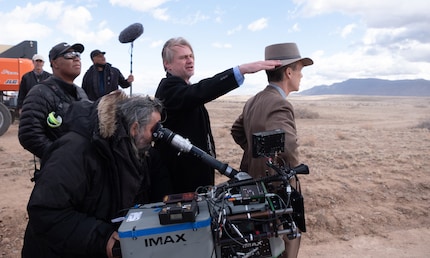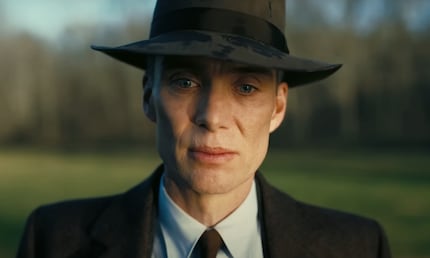
Review
Movie review: «Tenet» is confusing, overwhelming... and really good
by Luca Fontana

Bombast isn’t what carries Christopher Nolan’s Oppenheimer. It’s intimacy. The masterful interplay of small images in big stories – and vice versa. A masterpiece of opulent chamber drama.
Let me start off by saying that my review contains no spoilers. Any information stated here is featured in trailers that have already been released.
It wouldn’t be a Nolan film if the audience weren’t sitting in their seats exhausted at the end. Overwhelmed. Shook up. The very thought of collecting yourself sounds ridiculous. Let alone grasping clear thoughts, you haven’t even processed what you’ve seen yet.
Christopher Nolan is that kind of filmmaker. And once again he’s succeeded in making such a film. Maybe even his best so far.
The world is facing a war that will cost millions of lives. Who will come out on top? Impossible to predict. Except for physicists. For the new school of physics taught in Europe, quantum mechanics, is making groundbreaking progress. Especially when the first nuclear fission reaction succeeds in 1938 – pure science fiction. At least for most people. Scholars, however, quickly realise what this really means: the world will soon be able to pack the power of the sun into a small ball and shoot it across the ocean. A bomb.
An atomic bomb.
When J. Robert Oppenheimer (Cillian Murphy), one of the world’s brightest minds, takes charge of the Manhattan Project to build the atomic bomb, he’s not yet aware of the ethical demons he must face. Especially when Nazi Germany loses the war faster than expected and a new, nearly defeated enemy is found: Japan. Can the construction of the atomic bomb still be justified? Or is humanity heading for an irreversible chain reaction that will result in its own annihilation?
For once, Nolan doesn’t deliver an action thriller or science fiction film that defies imagination. Rather, Oppenheimer is a slowly told biopic without much fanfare. But Nolan is a master at building up such agonising tension in this steady flow of calm images that we viewers soon find ourselves longing for release. For the story of constructing the world’s first atomic bomb doesn’t just ask whether mankind is even capable of controlling its destructive forces. But whether it itself will be destroyed by them.

Of course, anyone who knows a touch of world history knows where Oppenheimer’s Manhattan Project is headed. Nolan’s narrative trick of drawing parallels between the story of the father of the atomic bomb and that of Prometheus right at the beginning is correspondingly ingenious: the Titan who stole fire from the Greek gods to give it to mankind. As punishment, Prometheus was chained to a mountain where he’d suffer endless torment for all eternity.
Oppenheimer fared similarly. In fact, Nolan’s screenplay is based on the Pulitzer Prize-winning biography American Prometheus, written by authors Kai Bird and Martin J. Sherwin. And just as Prometheus’s fire brought warmth and progress to mankind, the atomic bomb ended World War II. Making Oppenheimer the hero of the nation. A beacon of hope. And perhaps the most important voice in modern science since Albert Einstein.

But this is only the one half of the story. And Nolan wouldn’t be Nolan if he told them in a linear fashion. As if he had an obsession with not making things easy for his audience, his script jumps around unflinchingly between beginning, middle and end during the three-hour running time. But that’s exactly where Nolan’s genius lies. This way, you never get the feeling that the film is just plodding along. Rather, we experience a constant barrage of intense, dialogue-heavy scenes in which thespians like Emily Blunt, Robert Downey Jr, Matt Damon, Florence Pugh and Josh Hartnett truly act their socks off.
And, of course, Cillian Murphy.
Nolan has great interest in involving us viewers in the thought processes of Oppenheimer, played by Cillian Murphy. As a Jewish-American student in Europe – quantum physics was long disdained in America, so Oppenheimer went abroad – he experienced fascism and anti-Semitism first-hand. The idea that a Nazi state would build the atomic bomb before the Americans was horrifying to him. Correspondingly, his determination to be the first to achieve this scientific miracle arose.
Understandable? Absolutely. Nevertheless, his attitude toward the atomic bomb remained complex. Sometimes even contradictory. «If your calculations show that you are leading us to the end of the world, then stop your programme. And share your findings with the Nazis so that they don’t,» Albert Einstein, played by Tom Conti, once said to Oppenheimer, who was always aware of the apocalyptic power of his weapon of mass destruction. «But the world doesn’t know. It won’t know until we’ve used the bomb,» a steely-blue-eyed Cillian Murphy says.

He carries it. The movie. Every single second. Cillian Murphy’s performance is Oscar-worthy. Driven by the euphoria of making history. Naive enough to imagine that the atomic bomb would end not only the current war, but all wars to come. «Until someone builds a bigger bomb,» replies the ever-defiant Edward Teller, played by Benny Safdie, who years later will be instrumental in building the even more devastating hydrogen bomb.
Cillian Murphy’s Oppenheimer doesn’t want to hear it. With all his might he represses the ambivalence of his moral conscience. Until the Trinity test – the detonation of the first atomic bomb in human history. Setting: Los Alamos, New Mexico. A place where hundreds of scientists lived self-sufficiently and cut off from the world for years to complete The Manhattan Project. As Oppenheimer stared silently for minutes into the glare of that explosion, closely followed by a mushroom cloud, he’s said to have quoted from the Sanskrit Bhagavad Gita, a sacred Hindu scripture:
«Now I am become Death, the destroyer of worlds.»
And even then, Oppenheimer is said to have managed to underestimate the damage his bomb would later cause. It wasn’t until he received the first reports about the true destructive power of the bombs dropped on Hiroshima and Nagasaki that Oppenheimer began to radically change his attitude toward the nuclear programme. He used his newfound influence on science and politics to warn of the dangers of an arms race. Yes, of apocalypse itself.
Nolan’s film doesn’t shy away from showing this battle, waged both within himself and with the U.S. government, in all its detail in the second half of the film. Sometimes at the expense of clarity. Especially when time jumps between the various negotiations and hearings pile up in a frenzied staccato toward the end of the film – as they did in 2006’s The Prestige, Nolan’s most underrated work to date.
Especially here, the film demands everything from its audience. Although it is carried by an atmospherically insanely dense score courtesy of Ludwig Göransson. At times it even reminds me of Hans Zimmer’s music for Blade Runner 2049 – not to my displeasure. It’s probably no coincidence either. After all, the German-born director used to score Nolan’s films. Since Tenet, it’s been the Swede.
But then it comes, the last emotional hammer that mercilessly hits us viewers. Just before the credits. And then, at the latest, it becomes clear that Nolan has once again succeeded in creating a masterpiece of a film that combines small, intimate moments with large cinematic spectacle.
Oppenheimer has managed the feat of being a non-hectic spectacle. One that must be seen in the cinema. Preferably in an IMAX cinema. After all, Nolan shot his mix of chamber drama and visual grandiosity on 70 mm and in the IMAX format. It’s as if he and his now regular cinematographer Hoyte Van Hoytema were trying with all their might to stop the slow drift of big pictures into the streaming world. Like in the summer of 2020, when Nolan pushed through a theatrical release of Tenet despite the pandemic.
In fact, Nolan is one of the few directors who still creates stunning, lifelike backdrops and captures cinematic scenes without digital trickery. Not even the explosion of the atomic bomb was created on a computer, apparently. With that, Oppenheimer easily promotes itself as the pinnacle of Nolan’s cinematic genius.
The star director is supported by some of the best acting performances of recent years. First and foremost is Peaky Blinders star Cillian Murphy, who finally gets to play the lead role in his fifth collaboration with Nolan. Nolan did say that when writing the script he never had in mind which actors would play his characters. That limits him too much, he says. But with Oppenheimer, Murphy was the only logical choice, according to him. From the start.
And rightly so.
Oppenheimer will hit theatres July 20, 2023. Runtime: 180 minutes. Age rating: 12.
Header image: Universal Studios
I write about technology as if it were cinema, and about films as if they were real life. Between bits and blockbusters, I’m after stories that move people, not just generate clicks. And yes – sometimes I listen to film scores louder than I probably should.
Which films, shows, books, games or board games are genuinely great? Recommendations from our personal experience.
Show all